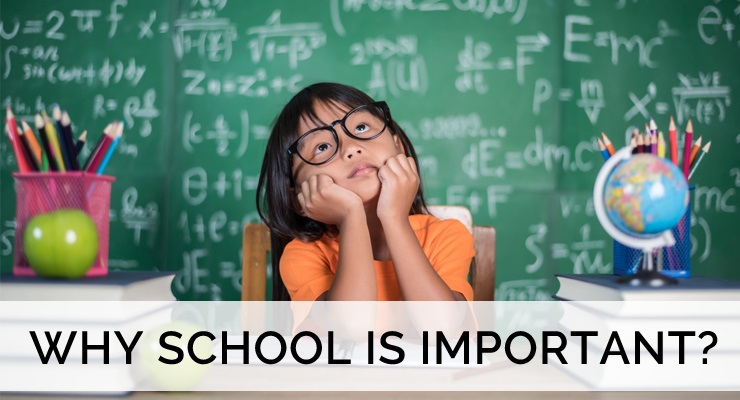Why is School Important:- Education is often described as the foundation of society, playing a crucial role in the development of individuals and communities alike. Schools are a primary avenue through which education is delivered, making them pivotal institutions in shaping the future of children. Understanding why school is important can help us appreciate the myriad benefits education provides, not just to individual students but also to families and societies as a whole.
1. The Role of School in a Child’s Development
a. Cognitive Development
One of the most significant benefits of attending school is the cognitive development it fosters in children. Schools provide structured environments where kids can engage in learning activities that stimulate their minds. Through lessons in subjects like mathematics, science, language arts, and social studies, children develop critical thinking and problem-solving skills essential for their future success.
Cognitive development also involves acquiring literacy and numeracy skills, which are foundational for lifelong learning. Studies have shown that early education correlates with better academic performance later in life, making school an essential part of cognitive growth.
b. Social Skills and Interaction
Schools are social environments where children interact with peers and adults outside their family units. This interaction is vital for developing social skills such as communication, teamwork, and conflict resolution. Through group projects, discussions, and extracurricular activities, students learn to collaborate and build relationships with others.
Socialization in schools also exposes children to diverse perspectives and cultures, fostering empathy and understanding. These experiences contribute to a well-rounded personality and prepare children to navigate the complexities of life in a diverse society.
c. Emotional Development
Attending school can significantly impact a child’s emotional development. It provides a space where children can experience both successes and failures, helping them build resilience. They learn to cope with challenges, manage their emotions, and understand the importance of perseverance.
Furthermore, schools often have counseling resources and support systems to help children deal with emotional issues and mental health concerns. By addressing emotional well-being, schools play a vital role in nurturing happy and healthy individuals.
2. Educational Equity and Accessibility
a. Bridging the Gap
Education is a powerful tool for addressing social inequities. Schools can provide children from disadvantaged backgrounds with opportunities they might not otherwise have access to. Quality education equips these children with the skills and knowledge necessary to break the cycle of poverty and improve their circumstances.
In many countries, government initiatives aim to make education accessible to all, regardless of socioeconomic status. By ensuring that every child has the chance to attend school, societies can work towards greater equity and justice.
b. Global Trends in Education
The importance of education is recognized globally, with many countries making significant strides toward universal access to schooling. According to UNESCO, the number of children out of school has decreased significantly over the past two decades, thanks to various educational initiatives. However, challenges remain, especially in rural areas and conflict zones where access to education is limited.
c. Education for Girls
Education plays a particularly crucial role in empowering girls and women. In many societies, cultural and economic barriers hinder girls’ access to education. However, educating girls has far-reaching benefits, including improved health outcomes, increased economic participation, and the ability to contribute to their communities.
Countries that prioritize girls’ education tend to see more significant social and economic progress. Educated women are more likely to advocate for their rights, pursue careers, and invest in the education of their children, creating a positive cycle of empowerment and development.
3. Lifelong Learning and Personal Growth
a. Fostering a Love for Learning
One of the most significant advantages of attending school is the opportunity to foster a love for learning. Schools introduce children to various subjects and disciplines, allowing them to discover their interests and passions. This exposure encourages students to pursue knowledge beyond the classroom, cultivating lifelong learners who seek to expand their understanding of the world.
b. Preparing for Future Careers
In today’s rapidly changing job market, the skills acquired in school are crucial for future employment. Schools equip students with essential skills such as critical thinking, communication, and adaptability, which are highly valued by employers. Additionally, vocational and technical education programs can provide students with specialized training for specific careers.
In a globalized economy, the ability to work collaboratively with people from diverse backgrounds is increasingly important. Schools play a vital role in preparing students for the realities of the modern workforce by instilling these essential skills.
c. Encouraging Personal Responsibility
Attending school also teaches children about personal responsibility. Students learn the importance of meeting deadlines, following rules, and managing their time effectively. These lessons in accountability and discipline are invaluable as they transition into adulthood.
4. The Community Aspect of Schools
a. Schools as Community Hubs
Schools often serve as community hubs, bringing together families and neighbors. They provide a space for parents to engage with educators and participate in their children’s learning journey. This community involvement fosters a sense of belonging and connection among families, contributing to a supportive environment for children.
b. Extracurricular Activities
Beyond academics, schools offer a wide range of extracurricular activities that enhance students’ experiences. Sports, music, arts, and clubs provide opportunities for children to explore their interests, develop new skills, and build friendships. These activities promote teamwork, leadership, and a sense of achievement.
c. Parental Involvement
Parents play a crucial role in their children’s education, and schools provide avenues for parental involvement. Through parent-teacher conferences, volunteer opportunities, and school events, parents can actively participate in their child’s education. This collaboration strengthens the home-school connection and reinforces the value of education.
5. The Global Importance of Education
a. Education as a Human Right
Education is recognized as a fundamental human right by the United Nations. Article 26 of the Universal Declaration of Human Rights states that everyone has the right to education, which should be free, at least in the elementary and fundamental stages. This recognition underscores the global commitment to ensuring that all children have access to quality education.
b. Economic Development and Education
Numerous studies have demonstrated the link between education and economic development. Countries with higher levels of education tend to have stronger economies, lower unemployment rates, and improved standards of living. Education drives innovation, productivity, and economic growth, making it essential for national progress.
c. Addressing Global Challenges
Education is crucial for addressing some of the world’s most pressing challenges, including poverty, inequality, and climate change. An educated population is better equipped to tackle these issues and advocate for sustainable practices. Education fosters critical thinking and empowers individuals to engage with complex global problems.
6. Conclusion: The Future of Education
In conclusion, the importance of school cannot be overstated. It is a vital institution that plays a fundamental role in the development of children and society as a whole. From cognitive and emotional growth to socialization and lifelong learning, schools provide the foundation for a successful future.
As we look to the future, it is essential to continue investing in education and ensuring that all children have access to quality schooling. This includes addressing barriers to education, particularly for girls and marginalized communities, and promoting inclusive and equitable educational practices.
By prioritizing education, we can empower future generations to thrive and contribute positively to their communities and the world. Education is not just a means to an end; it is a powerful catalyst for change, transforming lives and shaping a better tomorrow for all.















Leave a Reply